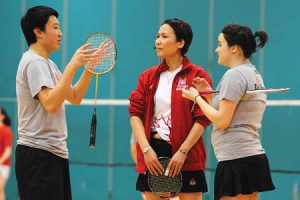
By Jim Hynes
They get by on the bare minimum of practice time and compete before only a handful of spectators, but the members of McGill’s badminton teams take their sport and their commitment to it every bit as seriously as their counterparts on the school’s higher-profile varsity squads.
With only six hours made available to them per week, the team members have had to look outside the Currie Gym walls for more practice time this year, explains team captain Laurianne St-Onge.
Technique, time and a little magic
“Last fall, a number of us participated in a fitness program put together by Ben Harack, one of the players, and most of us play with other teams and clubs to get more playing time, so that helps,” says St-Onge, a Levis, Que. native in the final year of an Honourers degree in Latin American and the Caribbean studies.
Luckily, St-Onge and her teammates can also count on experienced coach Margaret Lan Shen to help them improve their games. The second-year coach, who trained with the Chinese national badminton team in her native Shanghai, started playing the game at age nine and competed in national level competitions between the ages of 13 and 18.
“Margaret, has a lot to teach us in terms of techniques,” St-Onge says. “She has many ‘magic tricks,’ as I like to call them.”
Indeed, for Lan Shen, who operates the Future Star Badminton School when she’s not helping out at McGill, helping players improve is all about teaching technique and time spent working on the court.
“To become a better player usually someone would need a minimum of 8-10 hours per week of training,” Lan Shen says. “With the time we have, we have to give 120 per cent in every training session.”
Software problem
“My first feeling about badminton in Canada is: Great hardware but weak software, which means that we have a good gym in every school, but we don’t develop enough coaching knowledge here,” Lan Shen says. “We still have a lot to learn from Asian countries in this matter. Because badminton is a very technical sport, much more than many people think. I think that we need to have more people involved in this game at a young age. Right now, most people only play it for fun.”
That said, this year’s McGill squads feature a number of hard working standouts with impressive badminton skills. On the men’s side, Henry Pan, a 19-year-old science sophomore from Saskatoon who earned a bronze medal in men’s singles the Provincials as a first-year player last season, has become a dominant force. And the women’s team features veteran Annie Laforest, a third-year medical student from Laval who, together with partner Anna Durrant, won gold in women’s doubles last year.
Other notables include women’s doubles standout Vivian Pham, a first-year Arts student from Ottawa, and second-year men’s singles specialist Aatman Ajmera, a Materials Engineering student from Mumbai, India.
The Quebec Mixed and Individual Badminton Championships take place at the Université de Montreal, March 10-11.
